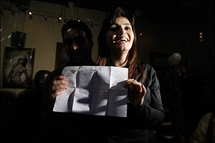
"I am joyful because it is a cause which is very dear to me," she said.
Civil weddings are recognised in Lebanon but cannot take place on national territory. Marriage, divorce and inheritance are regulated according to the conventions of Lebanon's 18 religious faiths.
The campaign for parliament to approve the option of civil marriage has been running for more than 10 years.
"It is a real shame that Lebanese people who don't believe in religious weddings should have to go abroad to get hitched," said Marc Daou, who conducted the ceremony in the role of "mayor".
In a grey suit with a smart tie, he stands ready for the happy couple at a small table in the "Lavish" bar, which is decorated with white balloons and is thronged with photographers and left-wing supporters of the campaign.
When the engaged couple are a bit late presenting themselves, he jokes: "Come on, come on, a civil servant cannot work until midnight."
Ougarit Dandache, who married a journalist colleague in a civil ceremony in the nearby Mediterranean island of Cyprus a year ago, proudly shows off her second "marriage certificate".
A few minutes earlier, when the "representative of the Lebanese Republic" asks her whether she is making her vows of her own free will, she replies with a pretence of gloom: "After a year of marriage? Yes I accept it, it is not the end of the world."
Marc then states in a formal tone: "In the name of the responsibilities bestowed upon me by the Lebanese authorities, I declare you man and wife."
Amid a chorus of cheering, the newly wedded couples dance to traditional Lebanese music with a glass of champagne in their hands.
Ahead of Valentine's Day in Beirut some couples are staging symbolic weddings. Duration: 01:43
Some guests act as if they are at a genuine ceremony, and Rayan's friends call out "Mabrouk, mabrouk" (Arabic for "congratulations"), slapping him on the shoulder.
Some couples come from different religions while others are from the same faith, but all the people here see themselves as secular.
Rayan, who dreamed up the not-quite official marriage event, is an activist in the Democratic Left, a member of Lebanon's ruling coalition.
"I am working for a secular Lebanon. The option of a civil marriage is just as much a right as a religious marriage. The world has changed and laws cannot remain the same," he said.
"A general election is coming (June 7) and we hope candidates will listen to us," Rayan said.
Elias Atallah, an MP and leader of the Democratic Left, has turned out to support the young people. "The religious communities have all the rights in Lebanon. A Lebanese person, as a citizen, has nothing," he said.
------------------------------------
Image of a Lebanese woman showing the civil marriage "contract" of Rana Khoury and Rayan Ismail, by Ramzi Haidar.
Civil weddings are recognised in Lebanon but cannot take place on national territory. Marriage, divorce and inheritance are regulated according to the conventions of Lebanon's 18 religious faiths.
The campaign for parliament to approve the option of civil marriage has been running for more than 10 years.
"It is a real shame that Lebanese people who don't believe in religious weddings should have to go abroad to get hitched," said Marc Daou, who conducted the ceremony in the role of "mayor".
In a grey suit with a smart tie, he stands ready for the happy couple at a small table in the "Lavish" bar, which is decorated with white balloons and is thronged with photographers and left-wing supporters of the campaign.
When the engaged couple are a bit late presenting themselves, he jokes: "Come on, come on, a civil servant cannot work until midnight."
Ougarit Dandache, who married a journalist colleague in a civil ceremony in the nearby Mediterranean island of Cyprus a year ago, proudly shows off her second "marriage certificate".
A few minutes earlier, when the "representative of the Lebanese Republic" asks her whether she is making her vows of her own free will, she replies with a pretence of gloom: "After a year of marriage? Yes I accept it, it is not the end of the world."
Marc then states in a formal tone: "In the name of the responsibilities bestowed upon me by the Lebanese authorities, I declare you man and wife."
Amid a chorus of cheering, the newly wedded couples dance to traditional Lebanese music with a glass of champagne in their hands.
Ahead of Valentine's Day in Beirut some couples are staging symbolic weddings. Duration: 01:43
Some guests act as if they are at a genuine ceremony, and Rayan's friends call out "Mabrouk, mabrouk" (Arabic for "congratulations"), slapping him on the shoulder.
Some couples come from different religions while others are from the same faith, but all the people here see themselves as secular.
Rayan, who dreamed up the not-quite official marriage event, is an activist in the Democratic Left, a member of Lebanon's ruling coalition.
"I am working for a secular Lebanon. The option of a civil marriage is just as much a right as a religious marriage. The world has changed and laws cannot remain the same," he said.
"A general election is coming (June 7) and we hope candidates will listen to us," Rayan said.
Elias Atallah, an MP and leader of the Democratic Left, has turned out to support the young people. "The religious communities have all the rights in Lebanon. A Lebanese person, as a citizen, has nothing," he said.
------------------------------------
Image of a Lebanese woman showing the civil marriage "contract" of Rana Khoury and Rayan Ismail, by Ramzi Haidar.









 Home
Home Politics
Politics









